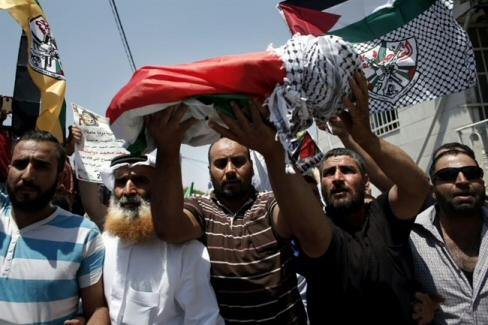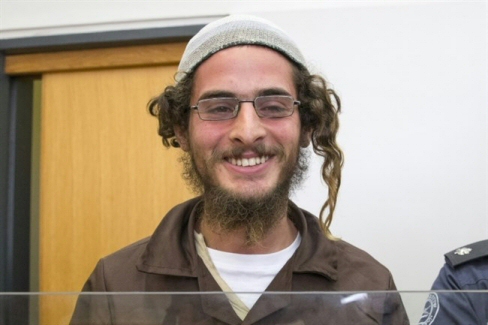Israel used a controversial form of detention without trial against an alleged Jewish extremist for the first time, following international outcry over the death of a Palestinian toddler in an arson attack.The use of ‘administrative detention’, which has been applied to thousands of Palestinians, came as Israeli authorities arrested another suspected Jewish extremist and extended the detention of the leader of a radical religious group.
According to AFP, none of the three were accused of direct involvement in last week’s firebombing of a Palestinian home in the occupied West Bank in which an 18-month-old toddler was killed.
On Tuesday, Defense Minister Moshe Yaalon signed an administrative detention order against Mordechai Mayer, an Israeli settler arrested for ‘his involvement in violent activities and terrorist attacks in recent times’, a defense ministry statement said.
Media reports had suggested the attorney general had given permission for the authorities to take such action against three suspected extremists.
Israel normally applies administrative detention against Palestinians, allowing them to be held without trial or charge for renewable six-month periods.
Currently, 379 of the 5,686 Palestinian prisoners held in Israeli jail are on administrative detention, according to official figures, and a long list of Palestinian prisoners have gone on hunger strike to protest the policy.
Israel’s routine use of administrative detention flouts international law, which stipulates that it may only be used in exceptional circumstances.
It can now be used for Jewish detainees in cases where there is insufficient evidence to go to trial or if the suspect refuses to testify.
‘Nationalist crimes’
On Monday, meanwhile, authorities detained Meir Ettinger, whose grandfather Meir Kahane founded the racist anti-Palestinian Kach group, and a court prolonged his detention until the weekend on suspicion of ‘nationalist crimes.’
Ettinger was arrested ‘because of his activities in a Jewish extremist organisation,’ a spokesman for the Shin Bet domestic security agency said.
Editor’s note: Shin Bet is, essentially, the equivalent to the US Federal Bureau of Investigation (FBI).
According to Israeli media, he was the brains behind a June 18 arson attack on a shrine in northern Israel where Christians believe Jesus performed the miracle of the loaves and fishes.
Police said Ettinger, 23, was suspected of ‘nationalist crimes,’ but did not accuse him of direct involvement in the attack in which the toddler died.
‘All that is window dressing, there is nothing on file’ connecting Ettinger to the crime, his lawyer Yuval Zemer told reporters after Tuesday’s hearing, which featured a smiling Ettinger flanked by two courtroom guards.
The hearing was held in private.
Citing a blackout ordered by the authorities, Zemer also said nothing about the exact reasons for his client’s arrest on Monday.
Another man, Eviatar Slonim, was arrested ‘for belonging to an extremist organisation,’ a Shin Bet spokeswoman said on Tuesday. No details were provided on any charges against him.
There was no suggestion that either Slonim or Mayer were suspects in Friday’s firebombing, which killed 18-month-old Ali Saad Dawabsha.
Dawabsha’s parents and brother were severely burned in the attack on their home and remain in a ‘critical’ condition, a hospital spokeswoman said.
‘Price tag’ violence
Graffiti at the site of the attack indicated it was carried out by Jewish extremists.
A Jewish Star of David was spray-painted on a wall along with the words ‘revenge’ and ‘long live the Messiah.’
That was indicative of so-called ‘price tag’ violence — a euphemism for nationalist-motivated hate crimes by Jewish extremists
The Palestinian Authority has submitted a request to the International Criminal Court to probe the firebombing and settler violence, the foreign ministry in the occupied West Bank city of Ramallah said.
Prime Minister Benjamin Netanyahu condemned the attack on the Dawabsha family as ‘terrorism in every respect,’ and vowed to spare no effort in bringing the perpetrators to justice.
However, his comments have been met by skepticism from many Palestinians, who have pointed out that Israeli government policies — including support for settlement expansion, and frequent impunity for settlers — allowed for the attack to take place.
Search IMEMC: ‘Ali Dawabsha’


